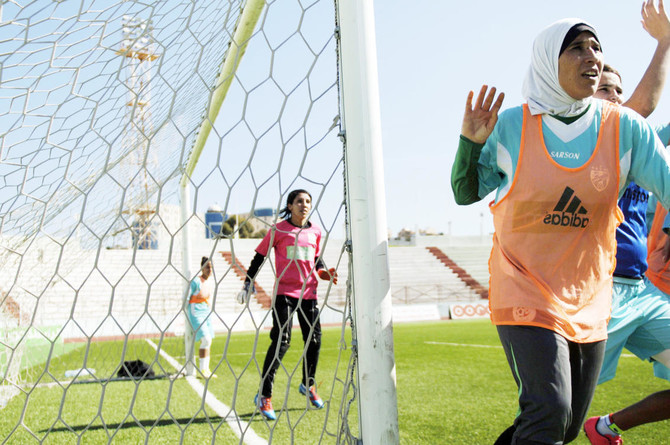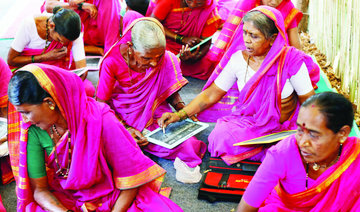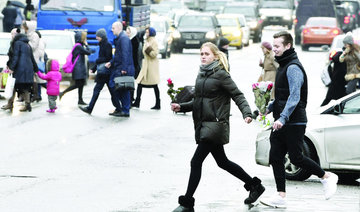ALGIERS: When Fathia was 7 years old, she would wait each day for classes to end, throw down her schoolbag and rush to play football with the boys from her neighborhood.
Now in her 20s, Algerian international Fathia plays for all-female club Afak Relizane, where love for “the beautiful game” has trumped gender stereotypes and even militant threats in the conservative yet football-mad North African nation.
Coach Sid Ahmed Mouaz helped to launch Afak in 1997 in the middle of Algeria’s blood-soaked civil war at a time when armed militants prohibited all women’s sport.
“The terrorists sent me a letter demanding that I stop girls’ football,” Mouaz recalls.
But he refused to be intimidated. Midfielder Fathia has gone on to triumph in multiple domestic and regional tournaments with her club.
Mouaz admits that his passion for football verges on the obsessive, but that drive has allowed him to assemble his squad of 15, who play and train despite the social stigma in Algeria of women playing sports.
“The girls have been insulted, people spit at the entrance to the stadium,” he says. For many families around Relizane, a town in Algeria’s agricultural heartland west of the capital, even today, “a good woman doesn’t play football.”
“Go home and make dinner,” or “find yourself a husband” are refrains heard frequently by players, according to the coach.
The squad meets at the town’s stadium for two-hour training sessions each day.
Despite modest facilities, the sessions are intense, in keeping with Mouaz’s mantra that his recruits must have “football in the blood.”
Ten of the players live full-time in club accommodation, fitted out with bunk beds, wardrobes, a television and stereo system.
A cook prepares meals for the players as freshly washed kits hang drying on the line outside.
When they are not training, they enjoy one amenity above all: Wi-Fi. The players stare into their smartphones, earphones in, and communicate with the outside world over Facebook.
Women’s football is an amateur sport in Algeria, with about 10 female clubs. One of the first set up, the Relizane club encourages the girls to study or work when not playing or training.
In spite of the team’s runaway success, local parents are often reluctant to allow their daughters to pursue football into adulthood.
“I’m proud of my daughter but I would be calmer if she stopped playing, got married and wore the veil like other women around here,” says Fathia’s mother, Fatma.
Whenever one of the girls is approached by a suitor, the player faces the same question: “Football or marriage?”
Mouna, a striker, is getting married next month and will probably have to give up the game.
“If they’re motivated, they will continue to play even after they marry,” says Mouaz.
Another restriction is money. Despite a heaving trophy cabinet and the town pride over its club’s successes, few locals turn out even for home games. The squad, which plays in green and white, has no sponsor or outside financing.
“There are no funds for a women’s football team in Relizane,” is a common complaint among players.
Six club members have represented Algeria at international level but their reward for winning a league game for Afak is the equivalent of €12 ($12.7) — “a pittance,” says Mouaz.
After their latest victory, a local official invited the girls for a reception in their honor, where the players were hoping for some financial reward.
Instead, each girl received a sports bag and a tracksuit.
But, as one club member defiantly puts it: “Love of football is stronger than backward attitudes, even after all that’s been done to break up this team.”
Algeria lady footballers wave red card at stigma
Algeria lady footballers wave red card at stigma

Red Cross vehicles arrive in southern Gaza location ahead of expected hostage release

KHAN YOUNIS, Gaza Strip: Red Cross vehicles arrived Saturday in a location in the southern Gaza city of Khan Younis where Hamas is set to release hostages as part of a fragile agreement that has paused fighting after more than 15 months of war.
A total of three male hostages are set to be released Saturday, expected to occur in two separate locations in the Gaza Strip, in return for the release of dozens of Palestinian prisoners from Israeli jails.
The hostages to be released, according to Hamas and Israel, are: Yarden Bibas, 35; American-Israeli Keith Siegel, 65; and French-Israeli Ofer Kalderon, 54. All were abducted during the Hamas-led attack on Israel on Oct. 7, 2023, that sparked the war.
It will be the fourth swap of hostages for prisoners since the ceasefire began on Jan. 19. Fifteen hostages and hundreds of prisoners have already been freed in that time.
Also on Saturday, wounded Palestinians are expected to be allowed to leave Gaza for Egypt through the Rafah crossing. It had been the only exit point for Palestinians during the war before Israel closed it in May. A European Union civilian mission was deployed Friday to prepare for the reopening of the crossing.
The reopening would mark another key step in the first phase of the ceasefire, which calls for the release of 33 hostages and nearly 2,000 prisoners, the return of Palestinians to northern Gaza and an increase in humanitarian aid to the devastated territory.
The imminent release of Bibas has brought renewed attention to — and concern for — the fate of his wife, Shiri, and their two young sons. All four were captured from Kibbutz Nir Oz.
A video of their abduction by armed men showed Shiri swaddling in a blanket her two redheaded boys — Ariel, 4, and Kfir, 9 months old at the time.
Kfir was the youngest of about 250 people taken captive on Oct. 7, and his plight quickly came to represent the helplessness and anger the hostage-taking stirred in Israel, where the Bibas family has become a household name.
Hamas has said Shiri and her sons were killed in an Israeli airstrike. Israel has not confirmed that, but a military spokesman recently acknowledged serious concern about their fates.
Yarden Bibas is believed to have been held separately from his family. Photos taken during his abduction appeared to show him wounded.
Like Bibas, Kalderon was also captured from Kibbutz Nir Oz. His two children and ex-wife, Hadas, were also taken, but they were freed during the 2023 ceasefire.
Keith Siegel, originally from Chapel Hill, North Carolina, was taken hostage from Kibbutz Kfar Aza, along with his wife, Aviva Siegel. She was released during the 2023 ceasefire and has waged a high-profile campaign to free Keith and other hostages.
The dozens of Palestinian prisoners to be released by Israel on Saturday include people serving lengthy and life sentences.
More than 100 hostages were released during a weeklong ceasefire in Nov. 2023. About 80 more hostages are still in Gaza, at least a third of them believed dead. Israel says Hamas has confirmed that eight of the 33 to be released in the first phase of the ceasefire are dead.
Israel and Hamas are set next week to begin negotiating a second phase of the ceasefire, which calls for releasing the remaining hostages and extending the truce indefinitely. The war could resume in early March if an agreement is not reached.
Israel says it is still committed to destroying Hamas, even after the militant group reasserted its rule over Gaza within hours of the latest ceasefire. A key far-right partner in Netanyahu’s coalition is calling for the war to resume after the ceasefire’s first phase.
Hamas says it won’t release the remaining hostages without an end to the war and a full Israeli withdrawal from Gaza.
In the Oct. 7 attack that started the war, some 1,200 people, mostly civilians, were killed. More than 47,000 Palestinians have been killed in Israel’s retaliatory air and ground war, over half of them women and children, according to Gaza’s Health Ministry, which does not say how many of the dead were militants.
The Israeli military says it killed over 17,000 fighters, without providing evidence. It blames civilian deaths on Hamas because its fighters operate in residential neighborhoods.
Facing flak, Red Cross defends its role in Israel-Hamas war

- The Geneva-based organization had been accused of not doing enough to help hostages in Gaza or Palestinian detainees in Israel
- ICRC officials said the organization could only do so much as it is reliant on the goodwill of the belligerents
GENEVA: The Red Cross, accused of not doing enough to help hostages in Gaza or Palestinian detainees in Israel, has defended itself in a rare statement outlining the limits of its role.
Insisting on its neutrality, the International Committee of the Red Cross said the escalation of violence in Israel and the Palestinian territories has triggered “a proliferation of dehumanizing language and of false and misleading information about the ICRC and our work in the current conflict.”
In recent days, ICRC vehicles have facilitated the transfer of Palestinians out of Israeli detention, and hostages held in the Gaza Strip since Hamas’s attack in Israel on October 7, 2023.
But the transfer of hostages to the ICRC has been sharply criticized following chaotic scenes on Thursday as masked fighters from Hamas and Islamic Jihad, carrying automatic weapons, struggled to hold back a surging crowd.
ICRC officials “did nothing to interfere with this intimidating display of indignity and public humiliation,” Gerald Steinberg, president of the right-wing Israeli organization NGO Monitor, wrote in the Australian-based online magazine Quillette.
The ICRC said: “Ensuring the safety and security of the handover operations is the responsibility of the parties to the agreement.”
Furthermore, “Interfering with armed security personnel could compromise the safety of ICRC staff, and more importantly that of the hostages.”
The Geneva-based organization also said it had not given permission for “people carrying Hamas flags to get on top of our buses in Ramallah” during the release of Palestinian detainees, “nor did we have the capacity to prevent people from doing so.”
In late 2023, Israel’s then foreign minister Eli Cohen said the Red Cross had “no right to exist” if it did not visit the hostages in Gaza.
However, the organization is reliant on the goodwill of the belligerents.
“From day one, we have called for the immediate release of all the hostages, and for access to them,” it says.
In World War II, the ICRC visited prisoners of war but its mandate did not explicitly extend to civilians unless governments allowed it.
The ICRC acknowledges that during World War II, it “failed to speak out and more importantly act on behalf of the millions of people who suffered and perished in the death camps, especially the Jewish people targeted, persecuted, and murdered under the Nazi regime.”
In its statement, the ICRC reaffirmed that it was the “greatest failure” in the organization’s history, and said it unequivocally rejects anti-Semitism in all its forms.
The ICRC has been accused, particularly on social media, of not putting pressure on Israel to secure visits to Palestinian detainees since October 7, 2023, and also of not doing enough to help the wounded in the Gaza Strip.
The humanitarian organization says it has been actively engaging with the Israeli authorities “to allow for the resumption of ICRC visits and family contacts for these detainees.”
As for the wounded in Gaza, the ICRC said it had received requests to evacuate hospitals in the north, but could not regularly safely access the area due the “extremely difficult security situation — together with roads blocked and unreliable communications.”
Following the ceasefire between Israel and Hamas that came into effect on January 19, the ICRC, which already had 130 staff in Gaza, is deploying more personnel, including doctors.
In 1968, Leopold Boissier, a former ICRC president, noted that the criticism most frequently levelled at the organization “is the silence with which it surrounds some of its activities.”
Nearly 60 years later, the ICRC is facing similar accusations, notably since Russia’s full-scale invasion of Ukraine in February 2022, and the Israel-Hamas war in Gaza.
Founded in Geneva in 1863, the organization, which has more than 18,000 staff in over 90 countries, denies being “complicit” and says it establishes trust through “confidential dialogue with all parties to the conflict.”
“Our neutrality and impartiality are critical to our ability to operate in any context.”
Egyptians protest at Rafah border crossing against Trump’s plan to displace Palestinians

- Trump said on Saturday that Egypt and Jordan should take in Palestinians from Gaza, which he called a “demolition site” following 15 months of Israeli bombardment
- Critics warned that Trump's suggestion was exactly what Israel's Zionist extremists have been trying to do, to kick out Palestinians from their homeland
CAIRO: Thousands of people demonstrated at the Rafah border crossing on Friday, an eyewitness told Reuters, in a rare state-sanctioned protest against a proposal earlier this week by US President Donald Trump for Egypt and Jordan to accept Gazan refugees.
Egyptian President Abdel Fattah El-Sisi on Wednesday rejected the idea that Egypt would facilitate the displacement of Gazans and said Egyptians would take to the streets to express their disapproval.
Protesters could be heard chanting “Long Live Egypt” and waving Egyptian and Palestinian flags.
“We say no to any displacement of Palestine or Gaza at the expense of Egypt, on the land of Sinai,” said Sinai resident Gazy Saeed.
Trump said on Saturday that Egypt and Jordan should take in Palestinians from Gaza, which he called a “demolition site” following 15 months of Israeli bombardment that rendered most of its 2.3 million people homeless.
On Thursday, Trump forcefully reiterated the idea, saying “We do a lot for them, and they are going to do it,” in apparent reference to abundant US aid, including military assistance, to both Egypt and Jordan.
Any suggestion that Palestinians leave Gaza — territory they hope will become part of an independent state — has been anathema to the Palestinian leadership for generations and repeatedly rejected by neighboring Arab states since the Gaza war began in October 2023.
Jordan is already home to several million Palestinians, while tens of thousands live in Egypt.
Egypt’s president El-Sisi congratulates Syria’s new president Sharaa, statement says

CAIRO: Egypt President Abdel Fattah El-Sisi congratulated Syria’s new President Ahmed Al-Sharaa, who was appointed on Wednesday by armed factions, and wished him success in achieving the Syrian people’s aspirations, El-Sisi said in a statement on Friday.
Sharaa, an Islamist who was once an affiliate of Al-Qaeda, has been trying to gain support from Arab and Western leaders since he led a rebel offensive that toppled former Syrian President Bashar Assad last year.
UN ‘alarmed’ at reported summary executions of civilians in Sudan

- After months of apparent stalemate in Khartoum, the army last week broke an almost two-year RSF siege of its Khartoum General Command headquarters.
GENEVA: The UN rights chief said Friday that he was “deeply alarmed” by reports of summary executions of civilians in Khartoum North, allegedly by Sudanese army fighters and allied militia.
“Deliberately taking the life of a civilian or anyone not or no longer directly taking part in hostilities is a war crime,” Volker Turk said in a statement.
The war between Sudan’s army (SAF) and the paramilitary Rapid Support Forces (RSF) since April 2023 has killed tens of thousands of people and uprooted more than 12 million, according to the United Nations, and pushed millions to the brink of famine.
After months of apparent stalemate in Khartoum, the army last week broke an almost two-year RSF siege of its Khartoum General Command headquarters.
On the same day, the army reported reclaiming its Signal Corps base in Khartoum North, and expelling the RSF from the Jaili oil refinery north of Khartoum.
The UN rights office said it had verified the killings of at least 18 people, including one woman, in seven separate incidents “attributed to SAF-affiliated fighters and militia since the SAF regained control of the area on 25 January.”
“Many of the victims of these incidents, which took place in the vicinity the Al Jaili oil refinery, were originally from the Darfur or Kordofan regions of Sudan,” it said.
The rights office also highlighted “further disturbing allegations emanating from Khartoum North,” which it was still corroborating.
It noted a video circulated Thursday showing men in SAF uniform and members of the Al Baraa Bin Malik Brigade in Khartoum North “reading out a long list of names of alleged RSF collaborators, saying ‘Zaili’ — Arabic for ‘killed’ — after each name.”
“These reports of summary executions, following similar incidents earlier this month in Al Jazirah State, are deeply disturbing,” Turk said, adding that “such killings must not become normalized.”
He reiterated his call for “all parties to the conflict to take urgent action to protect civilians and to uphold obligations under international humanitarian and human rights law.”
“Independent investigations must be held into these incidents in line with relevant international standards.”
The rights office voiced fear of further attacks “amid shocking threats of violence against civilians.”
It said it had reviewed a video showing a member of the Al Baraa Bin Malik Brigade “threatening to slaughter the residents of El Hadj Yusif in East Nile,” an area of Khartoum North.
The office also denounced continued RSF attacks on civilians and civilian infrastructure, including the shelling of a camp for displaced people in El-Fasher in North Darfur that killed nine civilians on Wednesday.
And on January 24, a drone attack on a maternity hospital in El-Fasher, attributed to the RSF, left at least 67 dead and 19 injured, it said.
“Deliberate attacks on civilians and civilian objects are abhorrent,” Turk said.
“Such attacks constitute serious violations of international humanitarian law and may constitute war crimes.”




















